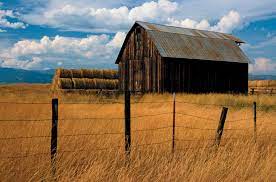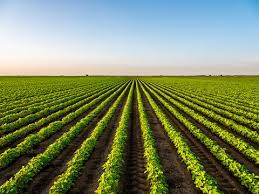The safety of insurance packages for farms can depend on several factors, including the type of farming operation, location, and specific needs. However, there are several types of insurance coverage that are commonly recommended for farmers to consider to protect their investments and mitigate risks. Here are some of the most common and important insurance packages for farms:

Crop Insurance: This provides coverage for losses due to natural disasters, weather events, and other perils that can damage or destroy crops. The U.S. government often subsidizes crop insurance for eligible farmers.

Livestock Insurance: This covers the loss of livestock due to various factors, including disease, accidents, or theft. It can also include coverage for loss of income related to livestock.
Farm Property Insurance: This covers damage to farm buildings, equipment, and machinery. It typically includes protection against fire, theft, vandalism, and certain natural disasters.

Farm Liability Insurance: This protects against legal claims and lawsuits if someone is injured on the farm or if the farm’s operations cause damage to others’ property. It can also cover liability related to products produced on the farm.
Farm Vehicle Insurance: If you have vehicles used for farm operations, such as tractors, trucks, or trailers, you’ll need specialized insurance to cover them.

Farm Equipment Insurance: This covers the repair or replacement of farm equipment and machinery in case of damage or breakdown.
Farm Business Interruption Insurance: This can provide coverage for lost income if your farm operations are disrupted due to a covered event, such as a natural disaster.

Environmental Liability Insurance: This can be important if your farm deals with chemicals or waste that could potentially lead to environmental damage. It covers the costs of cleaning up pollution or environmental damage caused by your operations.
Worker’s Compensation Insurance: If you have employees working on your farm, you may be required to provide worker’s compensation insurance to cover medical expenses and lost wages in case of work-related injuries.

Specialized Coverage: Depending on your specific farm activities, you may need additional specialized coverage, such as equine insurance for horse farms or dairy farm insurance for dairy operations.
To determine the safest insurance packages for your farm, it’s crucial to work with an experienced insurance agent who specializes in agricultural insurance. They can assess your farm’s unique needs and help you tailor a policy that provides the right level of coverage for your specific circumstances. Additionally, regularly reviewing and updating your insurance coverage is essential to ensure that it remains adequate as your farm evolves and grows.

Crop Insurance:
Multiple Peril Crop Insurance (MPCI): MPCI is the most common type of crop insurance. It provides coverage for a wide range of natural disasters, including drought, excessive moisture, hail, wind, frost, and other perils that can damage or destroy crops. The U.S. government often subsidizes MPCI premiums for eligible crops and regions.
Crop-Hail Insurance: This insurance specifically covers hail damage to crops and can be purchased as a standalone policy or as a supplement to MPCI.
Livestock Insurance:

Mortality Insurance: This type of insurance covers the death of livestock due to accidents, illness, disease, or natural disasters.
Livestock Gross Margin Insurance: It provides coverage for the difference between the total value of livestock and the cost of feed.
Farm Property Insurance:
Coverage for Buildings: This protects farm buildings such as barns, silos, and sheds from risks like fire, lightning, wind, hail, and vandalism.
Coverage for Equipment and Machinery: This covers the repair or replacement costs of farm machinery and equipment if they are damaged or stolen.
Farm Liability Insurance:

General Liability: Protects against third-party bodily injury or property damage claims that occur on your farm.
Product Liability: Covers claims related to products produced or sold by the farm, such as food products or agricultural supplies.
 Farm Vehicle Insurance:
Farm Vehicle Insurance:
This is similar to regular auto insurance but tailored to farm vehicles used for agricultural purposes. It covers liability, collision, and comprehensive damage for these vehicles.
Farm Equipment Insurance:
This covers the repair or replacement of specialized farm equipment, including tractors, combines, and irrigation systems.
Farm Business Interruption Insurance:
This coverage helps compensate for lost income and extra expenses if your farm operations are interrupted by a covered event. It can include coverage for crop failure or damage to farm structures.
Environmental Liability Insurance:
This insurance is important for farms dealing with chemicals, pesticides, or other substances that could lead to environmental contamination. It covers the cost of cleaning up pollution or environmental damage caused by the farm’s operations.
Worker’s Compensation Insurance:
If you have employees working on your farm, worker’s compensation insurance is often required by law. It covers medical expenses and lost wages for employees who are injured on the job.
Specialized Coverage:
Depending on your specific agricultural activities, you may need unique coverage. For example, dairy farm insurance may include coverage for milk contamination, while equine insurance can protect against horse-related liabilities.
When choosing insurance packages for your farm, it’s essential to consider the types of crops and livestock you have, the size of your operation, your location, and the specific risks you face. Working closely with an experienced insurance agent who understands agricultural insurance can help you customize a policy that addresses your farm’s unique needs while  ensuring you have adequate protection in case of unforeseen events. Regularly reviewing your coverage with your agent is also crucial to make adjustments as your farm evolves and expands.
ensuring you have adequate protection in case of unforeseen events. Regularly reviewing your coverage with your agent is also crucial to make adjustments as your farm evolves and expands.
